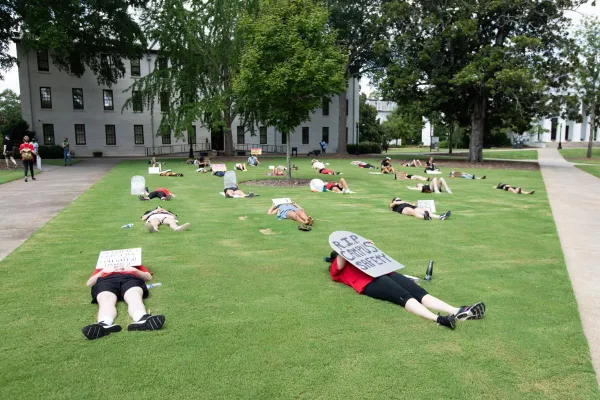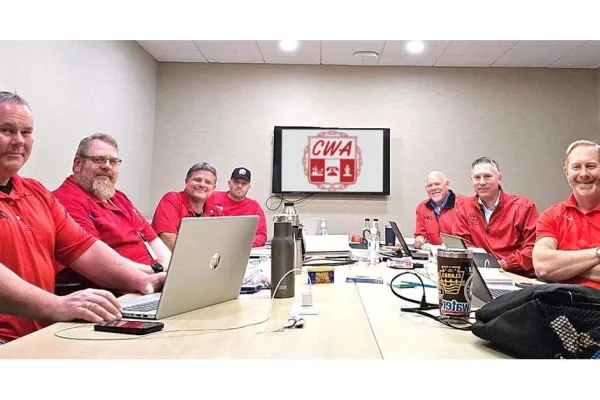Revise and Resubmit: Needed changes for Fall re-opening

Public pronouncements about in-person classes now are morally hazardous and intellectually bankrupt. Advocates for face-to-face learning point to weak or dubious evidence, even as they heap tremendous risk onto students and campus employees. Our evolving knowledge of COVID-19 in no way supports the argument that convening students and faculty indoors for extended periods is safe—even with masks, even with distancing, even with sanitizer, and especially when there is large scale, uncontrolled transmission of COVID-19, such as what is happening in Georgia.
The “evidence” marshalled doesn't stand up to the lightest scrutiny.
“Schools have safely re-opened elsewhere,” they’ve said. Sure, where community spread of infection has been controlled.
“College students can be responsible and can make adult decisions,” they’ve said. Right, but human development and psychosocial health research shows that many adolescent college students participate in risky behaviors that can be detrimental to their physical and psychosocial health.
“Residential halls can be cleaned deeply,” they’ve said. Unfortunately, there’s the fact that no campus site can be cleaned deeply enough. According to Katie Mack, a theoretical cosmologist at North Carolina State and Gavin Yamey, a physician and professor of global health and public policy at Duke University, reopening a campus is like “dropping a cruise ship into the center of town—and giving passengers free rein.” Not only can’t residential halls be cleaned deeply enough to stave off infection (COVID-19 is mainly spread “person-to-person through respiratory droplets”), but Mack and Yamey indicate that reopening a campus will “inevitably cause a spike in community spread, affecting the city, state, and beyond.”
And then there is that little problem concerning who staffs campuses. The American Council on Education finds that 17% - over 40% of staff are persons of color, and they are at higher risk of severe illness than others.
“Classrooms are where learning happens best,” they’ve said. Perhaps, but the USG bragged about how high students’ GPAs were in Spring, when much of the semester was conducted remotely, and faculty have worked to improve virtual learning.
We don't know how much risk you're willing to take, dear reader, but we can tell you that we’re not interested in taking on too much -- especially risk that threatens our lives especially when there are safe alternatives. Let's consider the USG's present plans to hold many courses in-person. What most of us know about this coronavirus is that it's highly communicable and frequently lethal (according to Mack and Yamey, students have already died from COVID-19). A large portion of people do not realize that there is risk of long-term suffering for those who survive. Issues related to blood clotting, stroke, embolisms, fatigue, heart palpitations, heart damage, lung damage (such as scarring of the lungs), and neurological symptoms have occurred even in young patients.
So how do we stop the spread of the virus? We already know the answer: by minimizing contact or proximity to others. Especially indoors. Especially for extended periods. Seems like students might be expected to spend a lot of time with others in residential halls, common areas, hallways, stairwells, classrooms, no?
Were a student to write a paper that argued for in-person classes, in which they put at risk the lives of themselves and their human subjects and for which they collected no data, they would earn a failing grade based on the risks to which they subjected their human subjects, the lack of evidence and the unsupported conclusion. But if a student revised that draft, taking into account real data and justified conclusions, they could improve that paper. Just like the USG still has the opportunity to revise the fall semester plan in three simple steps:
- move everything that can be done virtually to a virtual format,
- allow anyone to learn, teach, or work remotely if they wish to do so, and
- reserve PPE supplies for the handful of areas that require in-person interaction.
Such revisions would clearly improve more than grades: living students tend to learn more, especially when they work with living teachers.
(Photo courtesy of Caroline Head/Red and Black)
Georgia public universities’ ‘return to office’ mandate may spark exodus


